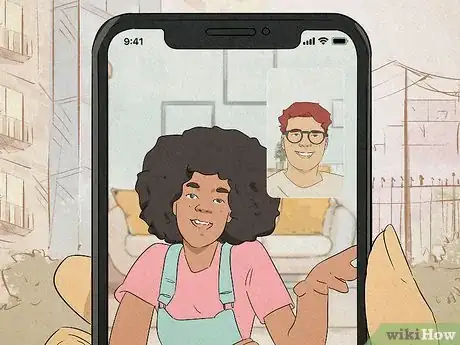This article was co-authored by Hardy Jean and by wikiHow staff writer, Hannah Madden. Hardy "Coach DT" Jean is a Dating Coach and the Head Coach & Co-Founder of Way Tooo Spicy LLP, a relationship and dating coaching service based in Boston, Massachusetts. Hardy's specialties include trauma healing, self-love practices, and modern dating tactics in an increasingly virtual world. He works with his clients to upgrade their dating experiences through healing trauma, implementing uniquely personalized dating gameplans, and empowering clients to attract partners that they deserve. He has a BA in Legal Studies from the University of Massachusetts Amherst and is currently pursuing his Juris Doctor at Northeastern School of Law.
This article has been viewed 6,496 times.
When you’re in school, you might feel like studying takes up your whole life—how, then, do you manage a long-distance relationship on top of that? It might sound like a lot, but many people do it successfully, and you can too. By keeping a few key factors in mind, you can maintain a healthy, happy relationship while also dedicating time to your studies and keeping your grades up.
Steps
Put school first.
-
Studying should always be your number one priority. If you have a huge test coming up and your partner is planning to come visit, let them know that you absolutely have to take a night to study. If they want to FaceTime, but you have homework to do, ask them to keep the convo short so you can get going. It may not be the most romantic thing in the world, but keeping your grades up while in school is the most important part of your life right now.[1] X Research source
- Unfortunately, your partner might get a little upset or annoyed that you have to prioritize school. If that’s the case, remind them that you won’t be in school forever, and that this is a temporary thing until you two can be together full time.
- Create balance between your individuality and your relationship.
Create a communication plan.
-
Is texting once a day okay, or would you prefer a phone call? Some couples FaceTime at the end of each day, while others text sporadically and then have a long phone call on the weekends. Take a look at your school schedule and try to figure out what works best for you, then talk to your partner about it. Set clear expectations so you're both on the same page.That way, no one gets bummed if you have to miss a nightly call for homework, and you can schedule out your talks in advance.[2] X Research source
- For instance, if you have 2 classes on Mondays but your whole Tuesday is free, tell your partner that you might not be able to chat much on Monday, but you could talk whenever on Tuesday.
- Or, if you’re super busy during the week but have weekends off, you might try texting during the week and then FaceTiming on Saturday and Sunday.
- Keep your own boundaries in the forefront of your mind—if your partner wants to talk every day but you know you won’t have time for that, tell them now so no one’s disappointed later on. Of the biggest dividers of relationships, especially for couples that are in the beginning of the relationship, is unvoiced expectations.
- It's common for someone to want to talk to you every single day, especially if they're interested in dating you long term. If that's not something that you can accommodate, try to make that abundantly clear from the beginning.
Schedule times for dates and phone calls.
-
A concrete, specific time will be much easier to add into your schedule. Instead of telling your partner that you’ll call them at some point over the weekend, ask them to chat on Saturday night around 8. That way, you can finish up your homework and any projects before you call, so you won’t be distracted as you two talk.[3] X Research source
- Scheduling out calls and FaceTime dates also ensures you won’t be busy with other stuff, like hanging out with friends.
Use technology to have date nights.
-
You don’t have to see each other in person to go out on a date. Call each other over Skype, Zoom, or FaceTime, and eat a nice meal “together” while you both chat about your days. Or, watch a movie together on Netflix or Hulu, using the watch party feature to start and stop the film at the same time. If you don’t have to have all your dates in person, you’ll have way more time for studying, since logging onto your computer for a Skype date doesn’t take long at all.[4] X Research source
- Send photos, audio clips, and videos to stay connected between dates.
Have study dates together.
-
Spend time with your partner while getting work done with this tactic. If you’re swamped with homework or projects to do, call your partner on Skype or Zoom, and then hang out together while you both study. If your partner isn’t in school, they can work on a passion project or even do something fun (but quiet), like playing video games. Even if you two aren’t talking, the simple companionship is enough to feel close to each other.[5] X Research source
Plan visits around your school schedule.
-
Try to see each other often, but don’t sacrifice your studies for it. Maybe wait until after finals are over to make the long trip to see your partner. Or, invite them to visit you near the beginning of the term when things are a little less hectic. Try to plan these visits in advance so you know they’re coming, and you can plan to finish up any projects or homework before your partner comes into town (or you have to leave).[6] X Research source
- Make it a priority to see each other in person. Create a timeline and count down the days until you can reunite.
- The distance between you two plays into this factor a lot. For instance, if you only live a few hours away from each other, you might be able to see your partner every other weekend. But, if you have to take a plane to get there, going once a term might be more realistic.
Talk about the important stuff over the phone.
-
Try not to text about big stuff, since it can get misconstrued. If you need to cancel a visit or you’re having issues in the relationship, call your partner up instead of trying to send one long message. Communication is very important in a long-distance relationship, so talking things out is much better than trying to text about them.[7] X Research source
- Plus, hashing something out over the phone usually goes much faster than texting back and forth about it. If you can resolve your issues quickly, you’ll have more time for your schoolwork.
Connect over the boring details.
-
Update your partner on your life and its happenings—even the mundane stuff. Talk to your partner about your long lecture or what you had for lunch. In a long-distance relationship, these details are important, because they give your partner a sense of what your daily routine looks like. If you’re struggling to think of what to talk about because your days are filled with studying and homework, tell your partner about that! They’ll be glad just to hear from you, and they probably want to hear the “boring” details.[8] X Research source
- If you don’t know these things about your partner, you can ask them! They might not know that you want to hear about them.
Talk with your partner about monogamy.
-
This will help you stop stressing about what your partner is doing. If you’re 100% monogamous, you should be able to trust your partner to stick to that while you two are apart. If you both want to let loose and live a little while studying, maybe you explain that flirting is okay, but no physical contact with anyone else. Try to have this relationship talk in person so you two can hash out any details before you’re not together.[9] X Research source
- This can sometimes seem unnecessary, but it’s a great way to give yourself peace of mind. You’ll be way less tempted to check up on your partner if you know the rules of your relationship, which means you’ll have a lot more time to study.
- If you're in a situation where you are so far away that you'd have to pre-plan trips to go see one another, it's usually a matter of being realistic about what this person expects from you while you two are not together. Avoid surprises and miscommunication.
Communicate with your partner about your struggles.
-
Long-distance relationships can be tough. If you’re having a hard time juggling your schoolwork, your friends, and your relationship, call your partner and talk about it. There’s a good chance that they’re feeling similarly, and you two can commiserate over your difficulties. Try not to bottle anything up, since that’s how resentment can start.[10] X Research source
- You could say something like, “Hey honey, do you have time to talk this afternoon? I’m feeling pretty stressed and overwhelmed, and I’d love to hear your voice.”
- Remember to tell your partner what you need and want, and be sure to understand and respect their needs and wants, as well.
Make time for your in-person friends.
-
As you navigate your responsibilities, don’t forget about your friendships. Although it can feel natural to dedicate all your free time to your partner, this could lead to some regret down the line. If your friends want to go out or they’re having a study session, feel free to join them, even if it means taking a night off from a Skype date with your partner. Don’t put your life on hold, and make sure you’re doing stuff for yourself, too.[11] X Research source
- If you’re in college, try to get involved on campus! Join a club, try out for a sport, or volunteer in the community. Live your life to the fullest so you don’t have any regrets at graduation.
Maintain a positive attitude.
-
You and your partner won’t be in a long-distance relationship forever. It's important to have a shared goal and vision for the relationship. Make sure you have a plan in mind with your partner so you have something to look forward to on the really hard days. The more you can keep that in mind, the more you’ll feel good about your relationship going forward.[12] X Research source
- In a lot of long-distance relationships, one partner will plan to move to the other person’s city (eventually) so they can live together.
Expert Q&A
-
QuestionHow do I know if I'm ready for a long-distance relationship?
 Moshe Ratson, MFT, PCCMoshe Ratson is the Executive Director of spiral2grow Marriage & Family Therapy, a coaching and therapy clinic in New York City. Moshe is an International Coach Federation accredited Professional Certified Coach (PCC). He received his MS in Marriage and Family Therapy from Iona College. Moshe is a clinical member of the American Association of Marriage and Family Therapy (AAMFT), and a member of the International Coach Federation (ICF).
Moshe Ratson, MFT, PCCMoshe Ratson is the Executive Director of spiral2grow Marriage & Family Therapy, a coaching and therapy clinic in New York City. Moshe is an International Coach Federation accredited Professional Certified Coach (PCC). He received his MS in Marriage and Family Therapy from Iona College. Moshe is a clinical member of the American Association of Marriage and Family Therapy (AAMFT), and a member of the International Coach Federation (ICF).
Marriage & Family Therapist Ask yourself these questions: Do we have a strong and healthy connection? Can we put in the necessary effort and tolerance to keep this relationship alive? Do we agree on what to expect in a long-distance relationship? Do we know the end goal of that relationship? Can both of us live without being together physically? Consider the sexual, emotional, and mental ramifications. Do we trust each other? Are there issues of insecurity, jealousy, and trust? Can we make the effort to keep things exciting and interesting? Can we be faithful to each other? Can we afford to visit each other from time to time? Can we handle uncertainty?
Ask yourself these questions: Do we have a strong and healthy connection? Can we put in the necessary effort and tolerance to keep this relationship alive? Do we agree on what to expect in a long-distance relationship? Do we know the end goal of that relationship? Can both of us live without being together physically? Consider the sexual, emotional, and mental ramifications. Do we trust each other? Are there issues of insecurity, jealousy, and trust? Can we make the effort to keep things exciting and interesting? Can we be faithful to each other? Can we afford to visit each other from time to time? Can we handle uncertainty?
You Might Also Like



 14 Fun Long-Distance Activities to Do with Your Girlfriend Online
14 Fun Long-Distance Activities to Do with Your Girlfriend Online



 Missing Your Girlfriend? 12 Ways to Feel Better Instantly and Connect with Her
Missing Your Girlfriend? 12 Ways to Feel Better Instantly and Connect with Her




 Forget Boredom! 8 Exciting Tips to Spice Up a Long-Distance Relationship
Forget Boredom! 8 Exciting Tips to Spice Up a Long-Distance Relationship
 Making a Long Distance Relationship Work: 9 Ways to Bring Back Love
Making a Long Distance Relationship Work: 9 Ways to Bring Back Love
References
- ↑ https://at.fhsu.edu/long-distance-relationships-in-college
- ↑ https://well.wvu.edu/resources/relationships/long-distance-relationships
- ↑ https://www.psychologytoday.com/us/blog/friendship-20/201806/10-tips-make-long-distance-relationship-work
- ↑ https://www.mentalhelp.net/blogs/survival-tips-for-long-distance-relationships/
- ↑ http://learningclicks.alberta.ca/student-life/how-to-make-a-long-distance-relationship-work-as-a-student/
- ↑ https://at.fhsu.edu/long-distance-relationships-in-college
- ↑ https://www.collegemagazine.com/three-major-keys-surviving-long-distance-relationship/
- ↑ https://www.psychologytoday.com/us/blog/friendship-20/201806/10-tips-make-long-distance-relationship-work
- ↑ https://at.fhsu.edu/long-distance-relationships-in-college
About This Article

























































